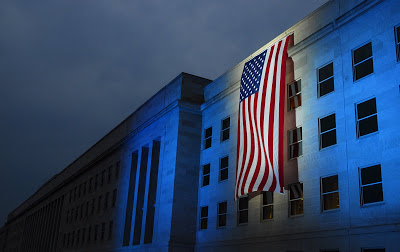Fifteen years after the deadliest terror attacks on US soil, Americans are remembering 9/11 and still grappling with its implications.
As with any mass tragedy, scars for some remain fresh as others have worked hard to move beyond the searing events of that sunny September day. Many – particularly those who experienced the chaos of that day first hand – still struggle with anxiety sparked by memories or images of buildings falling, scenes far more gruesome, or wonder why they survived when others didn’t.
Sept. 11, 2016, will be a day of public remembrance and personal reflection for a tragedy that killed 3,000 and injured some 6,000 more. A thousand first responders and others have died since of illnesses linked to the attacks, along with nearly 6,000 American troops who fought in the wars to avenge the attacks and prevent others.
In an election year, there will also be vulgar political grandstanding that shouldn’t distract us from thoughtfully taking stock.
What is clear is that the long war that began in 2001 continues and will, sadly, continue for many more years as a new generation of terrorists seek to make their mark.
The world is a different, and in some ways, more dangerous place today than it was in 2001.
America alone has spent more than $7 trillion on defense and nearly $700 billion on homeland security since the attacks. New wars have been fought, intelligence and surveillance — at home and abroad — have been dramatically expanded, new strike systems have been developed and air travel forever changed. These moves have disrupted terror operations, killed terror leaders and rank and file, and — so far — prevented another 9/11-style attack.
But fifteen years of war in Afghanistan and Iraq, the dissolution of Syria and Libya and subsequent the humanitarian and refugee crises, and sectarian unrest across the Middle East exacerbated by two US allies, Saudi Arabia and Turkey, and one enemy, Iran, have made things worse. Terror groups have splintered, franchised and become more violent, distributed and self radicalized.
Each of these conflicts has created new animosities and grievances to be avenged as sectarian tensions continue to boil. The human influx to Europe, the biggest since World War II, creates integration challenges that if not surmounted will only yield bitter fruit in the future.
Terror attacks have struck nations worldwide since 2001, and in Paris, Brussels and Orlando the bloodletting came at the hands of home-grown mass murderers who, feeling marginalized and disconnected from their societies, turned on them. ISIS has been particularly effective at producing social media propaganda to self-radicalize terrorists and motivate them to violence.
At the same time, governments have stepped up their intelligence game, sharing more information and leveraging the evolution of ever smarter and more ubiquitous communications and data systems have made it far easier for governments to keep tabs on citizens and connect dots that, a dozen years ago, were far harder to connect.
Instead of planning massive and grandiose attacks that could be detected by watchful and suspicious governments, today’s terrorists opt to use available means from firearms and explosives to trucks, cars and knives combined with simple coordination to execute multiple, smaller but nonetheless deadly attacks aimed sowing widespread anxiety and fear in otherwise peaceful societies.
These strikes, in turn, serve a powerful propaganda tool for terrorists: cause the nations that are targeted to adopt legislation that in turn target Muslims, feeding propaganda that the West is at war with Islam. When democratic nations impose bans on burkinis or head scarves that unfairly target Islam, they only create unnecessary distractions.
So what to do?
Terrorism is a tactic, not an ideology. Merely killing more terrorists, faster, won’t solve the problem. Yes, ISIS and its leaders must be relentlessly pursued while its toxic ideology countered at every opportunity. As much as possible, terror attacks must be disrupted as the root causes of violent extremism are addressed.
Intelligence and law enforcement agencies must remain vigilant as terrorists will use all means at their disposal to achieve ever more spectacular aims, including weapons of mass destruction. This vigilance, however, will come at a price: as technology advances – increasingly blur the line between legitimate and necessary surveillance of bad guys and excessive eavesdropping on innocent, law-abiding citizens.
Military forces – organized into coalitions – must continue aerial and electronic surveillance as well as targeted military operations to apprehend and when necessary, kill, suspected terror leaders and foot soldiers. But unlike the ham-fisted Russian approach in Syria, every effort must be made to minimize unnecessary casualties that merely fuel future revenge attacks.
It may be time to consider a more holistic plan to address the region’s challenges. Leading nations like the United States and its allies, as well as less friendly states like Russia and China must press Saudi Arabia and Iran to calm Sunni-Shiite tensions.
Having accepted more than 1 million Muslim refugees from the Syria, Iraq, Libya and elsewhere, Europe must now work hard to find suitable housing, employment and education to ensure these new immigrants are well integrated into society as productive citizens rather than angry, disconnected and vengeful.
The job will be massive and expensive, but a necessary investment in a more productive future.
The reality is, terror has always been with us and will continue to curse us into the future. It may not be the truly spectacular brand terror debuted in New York, Washington and Pennsylvania 15 years ago, but its very indiscriminate nature it will prove terrifying for many nonetheless.
That’s why populations must remain resilient and grimly pragmatic. Tomorrow’s attacks will be unpredictable and so, impossible to plan around and ultimately, avoid. Some will be plotted by committed terrorists, while others will be acts of violence by those who may claim terrorist affiliation to give their bloodletting greater shock value or motive.
After 15 years, what is uplifting is that those cities that have paid the highest price, none more than New York, have not forgotten what happened, but they have healed, remaining open, vibrant and welcoming, the antithesis of everything that the attackers stood for.




